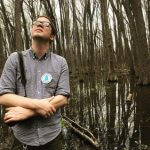Julian Gonzalez
Washington, D.C.
Julian Gonzalez serves as senior legislative counsel for Earthjustice’s Healthy Communities team in Washington, D.C., where he is the lead lobbyist on water policy. Julian partners with community members and NGOs across the country to push for laws and regulations ensuring that everyone has access to clean water, and ensuring that all of our rivers, streams, and lakes have strong protections from pollution. Before joining Earthjustice, Julian worked for GreenLatinos, handling water and oceans policy development, advocacy, and outreach to help ensure Latinx perspectives on water issues were reflected in Washington.
This interview was conducted by Carly Schmidt on December 7, 2020. Learn more about Julian’s work at Earthjustice.org.
Tell me about your role at Earthjustice.
My title is Legislative Counsel for the Healthy Communities Team within our Policy and Legislation Department. My role is to be the point-person for all things related to water policy for Earthjustice’s federal policy team here in DC. The first bucket of this work is the federal-facing work that you typically associate with somebody doing advocacy in DC. That might mean engaging with members of Congress; it might mean lobbying, or bringing in folks from different communities so they can speak to their representatives; it might mean conducting outreach campaigns on behalf of Earthjustice clients or partners on different water policy issues; and it might mean engaging with the EPA, through organizing comments for regulatory processes or discussions at stakeholder engagement opportunities, although less of that over the last four years.
The second bucket of this work (the more fun bucket) is the direct community relationship-building where I get to work with folks from different parts of the country, different areas of the environmental movement, and increasingly from outside of the environmental movement altogether. Doing that outreach and letting that drive Earthjustice’s policy work is our big goal as a department. For a long time, environmental groups have had a very mixed record—to understate the problem—of letting community voices and community needs guide their policy priorities. We’re trying to do a lot more of that and be more intentional about that. What that means for me these days in 2020 is lots of Zoom calls and phone calls, engaging with folks from all over the country to learn more about water policy issues and learn how Earthjustice can best collaborate with them to ensure that they have a voice here in DC.
How did you get into environmental justice work?

To learn more about Julian’s journey to environmental justice and background, read his article, ‘What Does Latinx Heritage Month Mean to Me? It’s About Pride, Empathy, and Anger.’
I grew up in New York City and enjoyed the Bronx Zoo, Central Park, and going camping outside of the city. I realized in high school that environmental work was an actual career path and not just something on Animal Planet. I was fortunate in that my parents encouraged me to study whatever I wanted in college, so I studied wildlife conservation biology. Even though some of my initial exposure to the field was in environmental justice work in New York City, I was pretty sure I wanted to be a marine biologist. I switched majors and it was great until I learned that research biology was not as interesting as I thought. I took an environmental law course that I liked a lot, and I was always drawn to policy because of the community work my parents did. It was a natural marriage of traditional conservation work and community organizing.
My first law school internship was at the EPA Regional Office in New York City, in their water law section. When I get to work on things that interest me, like water law, I tend to go full nerd and once you have policy knowledge in one area it becomes easier to seek out opportunities in that same area. That is how I ended up in regulatory policy, and specifically water policy. My first few jobs out of law school were all some variation of being the only lawyer in the room with a bunch of engineers working on regulatory analysis, so making sure that I could translate the technical details into policy implications was important. Now, shifting between community organizing conversations, policy talk, and technical information comes naturally. This helps quite a bit in my current role at Earthjustice, which is very fulfilling.
Which groups are you trying to engage from outside the traditional environmental movement and what are you trying to glean from those partnerships?
The first types of organizations that I work with are environmental justice organizations, in all of their forms—individual community organizations and coalitions, too. These folks have been fighting the most important environmental battles at the local level, at the city level, at the state level, and at the national level for decades, but they haven’t gotten their due and they haven’t gotten their respect from a lot of DC representatives. That’s because, if you picture environmentalism in like the ’60s or ’70s it’s very white and centered on rivers and streams only. Protecting all that is all very well and good, but there are a lot of communities that were systematically excluded from having their voice heard and their needs met in this traditional movement. Working with those groups and taking our cues from them is a big part of my work.
There are also other organizations in the mix—voting rights organizations, immigration rights organizations, organized labor groups, youth-led groups—that are still very siloed from the environmental movement. These days, groups like Earthjustice are confronting how the environmental movement is connected to criminal justice reform, voting, immigration, etc. because many of these same communities are being harmed by environmental pollution. These communities also often have the least say politically in the places they live, or they have a harder time becoming citizens, or they are targeted by police more often. These issues are not as separate as we in DC like to pretend. A lot of these folks, too, are interested in environmental advocacy, but they don’t always have the tools, opportunity, or vocabulary to make bells ring for folks in DC. We work with them on how we can translate their concern into specific asks of people in DC.
This year has been enlightening for a lot of folks in that many of these issues are completely inseparable, especially when thinking about the impacts of COVID on water access and affordability. Do you find that this melding of issues has complicated your communications with community groups or legislators, or are you finding more bridges?
Definitely bridges on both ends: between us and communities and between us and legislators. It has given communities a unique opportunity to advocate for solving water issues, since members of Congress can’t (or at least shouldn’t) brush the pandemic under the rug. Community groups realize this, so we tried to help amplify their messages about water shutoffs and continue to build trust with them. For us, you can’t approach this relationship-building like a bull in a department store. There’s a way to build relationships right, where it’s genuine, long-term, and not just asking for communities to show up in DC and never talk to them again. We approach folks and organizations with openness and without an agenda. We show up and say, “Hey, we’re Earthjustice. This is what we do. How can we help?” That’s what we tried to do with the pandemic.
We are expecting a new president to be inaugurated on January 20. Are you hopeful in this transition and the new administration?
I’m cautiously optimistic. I think, obviously, putting an end to the Trump administration can’t be understated in how big that is for water policy. We’ve spent a lot of our time in the last four years just playing defense and trying to keep up with a million different terrible regulatory changes that would harm safeguards to clean water, clean rivers, and clean drinking water. It’ll take some time and resources to undo a lot of that. Beyond that, there’s almost certainly going to be some smart folks within the new administration, hopefully within EPA, who are forward-thinking and have experience with community organizing. I hope that they can put that lens over their water policy work and ensure that communities are consulted when they’re developing policy at EPA or when they’re pushing Congress to develop policy.
But they’re not going to automatically do any of this, right? As a community of advocates from all backgrounds, we need to push members of Congress. The water policy community is more organized now than it has ever been before. We have champions in Congress, like Representative [Rashida] Tlaib, who has experience working on the ground with environmental justice leaders and Indigenous communities. We have a lot of strong allies under our tent, but legislating is still going to be difficult, so we have to figure out how do we translate a slim majority in Congress, President Biden in the White House, and a stacked-against-us judiciary into effective water policy. It’s going to take some creative thinking and a lot of activism, but it’s something that I’m looking forward to being a part of.
It seems like there’s a road ahead for addressing these rollbacks in 2021. How would you advise community groups and organizations to put pressure on the administration to address the issues that are top-of-mind?
There are really two things that I would advise. One is just ground-up work. Whether that’s your representative in Congress or even more local or state level, make sure that your representatives have plans and have thoughts on water access and affordability. And if they don’t have a plan, ask them why they don’t. I definitely don’t expect every elected representative to have an opinion on the 401 water quality certification rule, but they should have thoughts on water quality in general. You can ask any representative in Congress about climate change, even if their district is not experiencing the most dire impacts, but they’ll still have answers for you. That’s not the case with water policy and, for me, that’s not acceptable.
The other advice I would give is to find out what environmental justice organizations are near you or around your in your state and see what they’re up into. If you’re not already plugged into that movement, if you follow their lead you’ll probably find the answer to “what is the best way I can have an impact on this issue as an organization?” I think that, to the extent that they have time and resources to spare, folks and organizations should always consider how their mission intersects with other movements. This is something I’ve been saying a lot on River Network Policy Update calls because we always get such a broad variety of groups in attendance. Folks are increasingly wanting to know how they can support on the heels of a Black Lives Matter protest, for example. It’s tough, but a small staff can have an impact just by connecting with other local groups and asking how they can help.
I want to go back to what you said about being cautiously optimistic. We’re hearing a lot about Biden building his climate committee and implementing the most ambitious climate plan that there’s ever been in the United States, which many would argue is still insufficient. What are the gaps in his policy priorities and where should individuals and organizations be putting pressure?
Obviously, climate is the priority issue for most organizations. The next big step for the water advocacy community as a whole is to do a better job of hitching our wagon to the climate movement because there’s not going to be many opportunities for the Biden administration or for Congress to do a whole lot of legislating unless a very specific, narrow set of conditions are fulfilled. They’ve discussed a big climate bill to fulfill Biden’s ambitious climate agenda or, if not the climate bill, then lots of executive branch action through EPA and other agencies. For me, we should be putting pressure on Congress and the White House to emphasize water infrastructure. Any climate package is going to involve tons of infrastructure. Rebuilding and repairing infrastructure and building new infrastructure creates green jobs and normalizes new technology that is less harmful to the environment, and green water infrastructure is a huge part of that. Water infrastructure and access to water during emergencies go hand in glove with climate action. If we can have a strong voice during those conversations, then I think we’ll get some good wins.
Through that ground-up approach and finding the local organizations in your area that are already tackling those issues, right?
Yeah, exactly. You let your representatives know that during this hurricane or this rainstorm, communities didn’t have access to water or they experienced flooding. Then, hopefully, those issues become a bigger concern for some representative, and then there’s a conversation on flood management and impact on disadvantaged communities. That’s how it’s supposed to work in theory. Obviously, it’s a lot more annoying and complicated than that in real life, but that’s the idea.
What makes it annoying and complicated in real life?
It’s never as simple as “tell your representative and you’ll see action,” like we learned in grade school. You have to force legislators to have a conversation 95% of the time. That means organizations have to put in tons of work and partner up and really be persistent in order to ensure that their perspectives are heard, especially if you’re from a community that historically has been ignored. Unfortunately, the situation a lot of the time is that it takes a big group like Earthjustice making noise or being present for these conversations to put pressure on the person who is supposed to listen to constituents. If you are a larger organization with more resources to the extent that you can be a megaphone and amplify those groups, that goes a very long way.
What are you most looking forward to with the change in administration in January?
An EPA that is helpful and useful. That’s a big one. There’s a lot of changes that should happen within the EPA that can make them more responsive to community concerns, whether that’s how they use data, how they make water quality and water access data available to community groups, or enforcement of the Clean Water Act and the Safe Drinking Water Act. I’m looking forward to seeing that enforcement done at a more respectable level than what we’ve seen over the last four years. I think the good thing about coming in after an administration that has done all these rollbacks is that you have data on what parts of the rollbacks worked and didn’t work, so the folks at EPA are going to have a lot of information to work with on the best way to go about undoing the damage that was done. I’m also looking forward to the EPA bringing in people with different perspectives; people of color and Indigenous folks and community organizers; into the agency so that rather than depending only on stakeholder meetings for those perspectives, you have them internally as well.
The second thing [I’m looking forward to] is continuing the water access conversation that has been highlighted by COVID. Communities have justifiably made a lot of noise on water shutoffs, which was a human rights issue long before the pandemic. Offices that have not previously taken note of this issue are all of a sudden interested and involved, including some congressional leadership. I really do think that one small silver lining to this terrible pandemic is that some water issues—like water access and infrastructure—have been brought to the attention of some elected representatives who were either unaware or didn’t make these issues a priority. Piggybacking off of that for the duration of the next administration is going to be really important, making sure that we pressure representatives to keep that same energy that they’ve had during this pandemic about water shut-offs and reminding them that many communities (especially tribal communities) have had wastewater, water access, and water quality issues even before the pandemic. In many ways, that word is out and you can’t unring that bell. We need to keep up this momentum.







